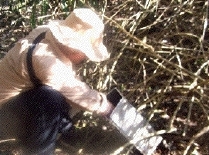 |
||||||||||||
|
||||||||||||
|
|
||||||||||||
|
|
||||||||||||
Fauna surveys
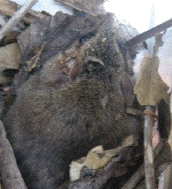 Zoologist Ronda J. Green, BSc(Hons), PhD
has had extensive experience in ecological research
and fauna surveys in south-eastern Queensland and
other areas of Australia. Her son Darren has been
assisting since his childhood and a proficient amateur
naturalist and handler of animals. Working as a team they
can:
Zoologist Ronda J. Green, BSc(Hons), PhD
has had extensive experience in ecological research
and fauna surveys in south-eastern Queensland and
other areas of Australia. Her son Darren has been
assisting since his childhood and a proficient amateur
naturalist and handler of animals. Working as a team they
can:- produce a list of mammals, birds, reptiles,
frog and other fauna of a given site (given
constraints of time available for data collection)
- assess habitats and seasonal differences within a site or between sites
- provide a detailed report with interpretation of the ecological roles, species interactions and conservation implications of what has been found
- offer advice on on-going management, development restrictions or modifications, habitat enhancement, monitoring, nature interpretation or further investigations
- offer advice on interpretation of wildlife for tourism
properties
We
recommend wherever possible at least two visits of at
least four days each for major projects, to ascertain
differences between seasons and to increase chances of
observing inconspicuous species
Conservation management and other environmental consultancies
- General environmental
impact assessment of a site (which may or may not
include a fauna survey as outlined above)
- Providing advice as to whether certain developments are compatible with biodiversity conservation and whether any threatened species or communities are involved
- Assessment of nature
interpretation possibilities of a site to be used
for ecotourism
Nature Interpretation products/services (computer programs, videos, signs, written materials)
Denis
Green
has written a bird call
quiz which has proved very popular at the Lamington
Natural History Association's Information Centre at
Binna Burra (at the edge of Lamington National Park).
Ronda wrote an extensive natural history information
program for the same computer, using photos taken by
herself, Darren Green and
Lesley Hutley (former LNHA president)
Ronda Green has designed a number of nature trails and published 'Guidelines to the Preparation of Nature Trails through the Australian Conservation Foundation. She has had long experience in nature interpretation for all ages, and is currently expanding the displays in the Scenic Rim Wildlife Ecology Centre and associated nature trails on the Araucaria property
We are available for consultation on the development of interpretive materials, including nature trails and computer programs
Ronda Green has designed a number of nature trails and published 'Guidelines to the Preparation of Nature Trails through the Australian Conservation Foundation. She has had long experience in nature interpretation for all ages, and is currently expanding the displays in the Scenic Rim Wildlife Ecology Centre and associated nature trails on the Araucaria property
We are available for consultation on the development of interpretive materials, including nature trails and computer programs
Musical
composition and performance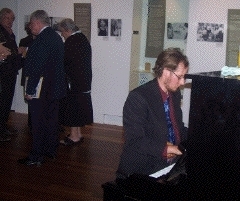
Darren Green showed
talent for music at an early age when we got our first
piano and at age three, barely able to see above the
keyboard, he started working out not just simple
melodies but quite complex ones. He has played
violin, guitar and recorder but his favourite instrument
is the piano, on which he writes many of his own
compositions. He also composes on an electronic keyboard
(solar-powered of course) and an Apple computer. He has
studied musical composition at tertiary level and gets
something akin to withdrawal symptoms if away from a
piano for more than a couple of days. He now
performs his own compositions in various public venues.
He is available for performances and for consultation on possibilities for composing music for videos (especially nature videos), games and other projects.
He is available for performances and for consultation on possibilities for composing music for videos (especially nature videos), games and other projects.
Conservation and animal welfare principles
We have on occasion been
asked by developers to 'please don't find anything' on
the properties they wish to develop. We ignore these
pleas, and do the job we are actually employed to do -
to objectively assess the fauna and flora and what
impacts any proposed development might have on it.
We believe that this also works to the advantage of the
developer when we do not find any pressing reasons for
halting or modifying the development - by establishing a
reputation for honesty in reporting, a 'go-ahead' by us
means more than it would from agents who willingly
comply with requests to 'go soft' on the developers.
To do an adequate job that really means something, we recommend a minimum of two surveys, the first starting six months prior to the time the environmental impact assessment is required. This allows us to look at what animals are present in at least two seasons. All too often the ecologists are called in when only a few weeks are still available, whereas the planning has been in process for months or years, with consultation with engineers and others proceeding well beforehand. A serious assessment of ecological processes and species presence should also begin in the early stages.
See also wildlife conservation and wildlife conservation and tourism
We have official ethics clearance from Queensland Primary Industries and Fisheries, and abide by all recommendations to ensure that any impacts on the animals we capture or otherwise encounter in our surveys are minimised. We would prefer to forgo an identification than to harm or destroy and animal in an attempt to record it. We are mindful that animals sitting in traps waiting for us to check and release them are necessarily under some stress, and we attempt to minimise this by providing. leaf litter and other natural material within the trap, insulating the trap by further leaf litter and bark placed on and around it to shield it from cold at night and sun in the early mornings, and a small food reward beyond that sufficient to initial attraction to make up for the animal being unable to carry out its normal foraging activities through the night. We always check the traps and release animals as soon as possible after dawn. Handling is gentle (with restraint just firm enough to avoid being bitten) and kept to the minimum necessary for identification.
See also animal welfare
To do an adequate job that really means something, we recommend a minimum of two surveys, the first starting six months prior to the time the environmental impact assessment is required. This allows us to look at what animals are present in at least two seasons. All too often the ecologists are called in when only a few weeks are still available, whereas the planning has been in process for months or years, with consultation with engineers and others proceeding well beforehand. A serious assessment of ecological processes and species presence should also begin in the early stages.
See also wildlife conservation and wildlife conservation and tourism
We have official ethics clearance from Queensland Primary Industries and Fisheries, and abide by all recommendations to ensure that any impacts on the animals we capture or otherwise encounter in our surveys are minimised. We would prefer to forgo an identification than to harm or destroy and animal in an attempt to record it. We are mindful that animals sitting in traps waiting for us to check and release them are necessarily under some stress, and we attempt to minimise this by providing. leaf litter and other natural material within the trap, insulating the trap by further leaf litter and bark placed on and around it to shield it from cold at night and sun in the early mornings, and a small food reward beyond that sufficient to initial attraction to make up for the animal being unable to carry out its normal foraging activities through the night. We always check the traps and release animals as soon as possible after dawn. Handling is gentle (with restraint just firm enough to avoid being bitten) and kept to the minimum necessary for identification.
See also animal welfare
Previous consultancies
- various fauna surveys, workshops and other consultancies through Sci-Plan
- preparation of interpretive computer programs for the Lamington Natural History Association (Binna Burra) and Lillydale Host Farm
- survey of various properties for Scenic Rim Regional Council and Logan City Council of properties about to undergo voluntary vegetation conservation covenants
- fauna
surveys
of various development sites and natural habitat
adjacent to development sites for the former Pine
Rivers Shire Council (now incorporate into Moreton Bay Regional
Council)
- fauna survey of
various sites of Russell
Island Wetlands (Moreton Bay)
for a local conservation group
- fauna survey of Aboriginal-owned property at Mt Barney for Yugambeh Land Enterprises Ltd.
- various other fauna
surveys and environmental impact assessments
- musical performances by Darren Green at various venues in the Scenic Rim
- voluntary surveys for
Scenic Rim Wildlife along a proposed CSG pipeline
route (on-going)
- voluntary surveys for Protect The Bush Alliance to help determine fauna present in areas of conservation concern (on-going)
- voluntary coordination of and participation in surveys of the five glider species in the Scenic Rim for Scenic Rim Wildlife (on-going)
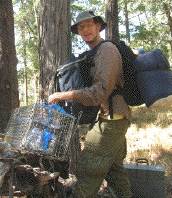
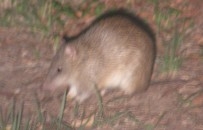
Rates
Our prices vary with the job and the client, e.g.- Fauna surveys:
- For large
corporations we generally charge $440.00 per day
(including GST and reasonable travel),
- for local government
and small businesses $330.00 per
day, and
- for conservation groups and other non-profit $165.00 per day (other by negotiation, or barter - e.g. assistance with weed removal on our property in return for a fauna survey).
If more than 40km from
home or from Brisbane, we may require transport and
budget accommodation expenses in addition to the
above, but are also willing to camp on or near some
properties, with permission of the landowner, to
minimize traveling time and cost and to be close
enough to check traps as soon as possible after dawn
or to quickly remove them if conditions suddenly
change (e.g.prediction of flash flooding or bushfire).
- Darren's musical performance: $330.00 for the evening (negotiable for non-profit groups).
